Your cart is empty


Pedro Delgado: Spanish Steps and the 1988 Tour de France
Words: Carlos Arribas
Photos: Timm Kölln
Fifteen years on from Luis Ocaña in 1973, no Spanish rider had won the Tour de France. Delgado starts the race downbeat, but soon has the nation glued to their radios. ‘Perico’ recalls a long day to Alpe d’Huez.
On the 1988 Giro, Delgado was far from outstanding, finishing seventh, 17 minutes behind the winner Andy Hampsten. “The Giro hadn’t gone well and I got to the Tour feeling very pessimistic,” he says. “But, of course, I was aware of the situation and what was at stake, and I remember there was a great deal of pressure on the team.
“There had been budget cuts at Reynolds and there was already talk of a second sponsor… And as they hadn’t achieved a good result in the Vuelta, the team were quaking in their boots when they arrived; it was all or nothing. The assistants even had the feeling that the team would soon disappear. Echavarri didn’t show it: he kept it all inside but I knew he was worried and I knew it was killing him. He only relaxed when things started to go well on the Tour.
Miguel Indurain - The Endless Enigma
“The moment we knew that the race belonged to us was in the team time-trial and we were pumped up for it. We didn’t win it – if we could just win, I thought. We didn’t lose any ground though. Suddenly, the atmosphere of the first four days changed and everyone focused solely on the race.
"I felt I was in control and prepared to win on the day before Alpe d’Huez in Morzine, where [Fabio] Parra won. I felt really good there: everyone else looked tired while I felt as fresh as a daisy. But I didn’t go all out, as it was a tough stage, and seeing how worn out everyone looked made me feel good and ready to win.
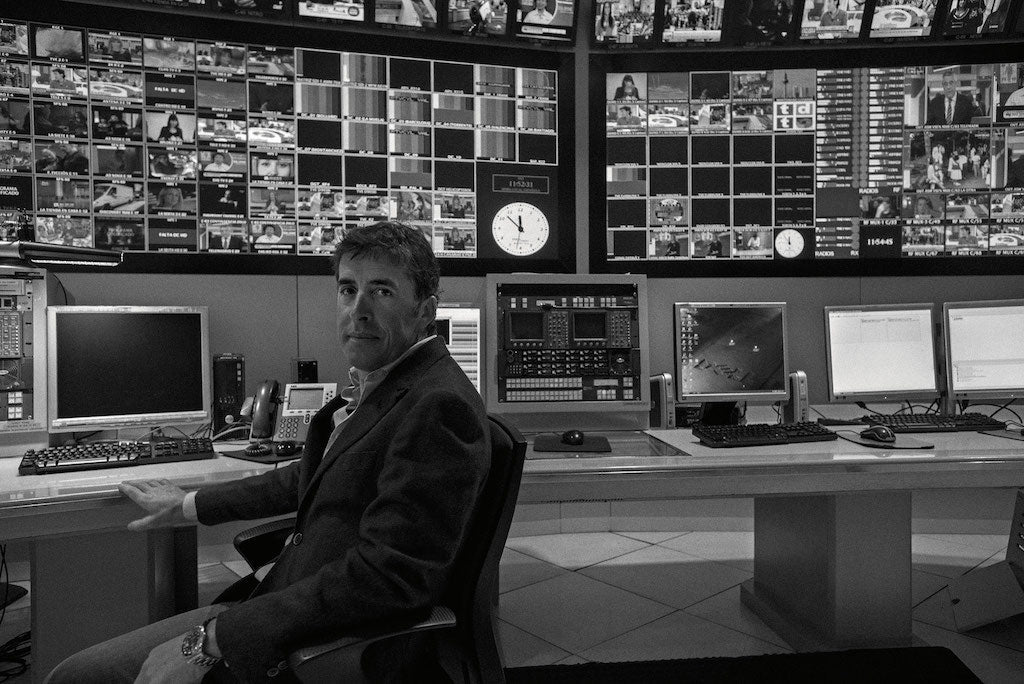
“The next day to Alpe d’Huez was just crazy. It was a very long stage, some 220km, and from the start in Morzine the pack became fragmented, with Mottet and I pulling away. Before the Madeleine there was a battle, and a particularly brutal one too.
Related – Tour de France 2021 Preview
“We got to the foot of the Madeleine, which is where everyone regrouped in the valley, but we were all shattered. I was doing well, but I wanted to save my strength so I held back. On the Madeleine, nobody made a move – we were all scared. I reached the top and crossed the line with [Ángel] Arroyo not far behind. ‘Let’s set this thing off’, he says, ‘no one’s doing anything’. ‘No, no, we’re going to wait’, I told him.”
Delgado called up his troops: Jesus Magro, Omar Hernández and a young man by the name of Miguel Indurain.
“The bunch was about 50 strong. I told Arroyo: ‘We’re all going to sprint up the mountain and Miguel, who knows the descent, will take us down the Madeleine as fast as he can until we get to the feed station in the valley before the Glandon. We’re going to go so fast that some people are going to be left without a musette because they won’t have a chance to pick it up’.
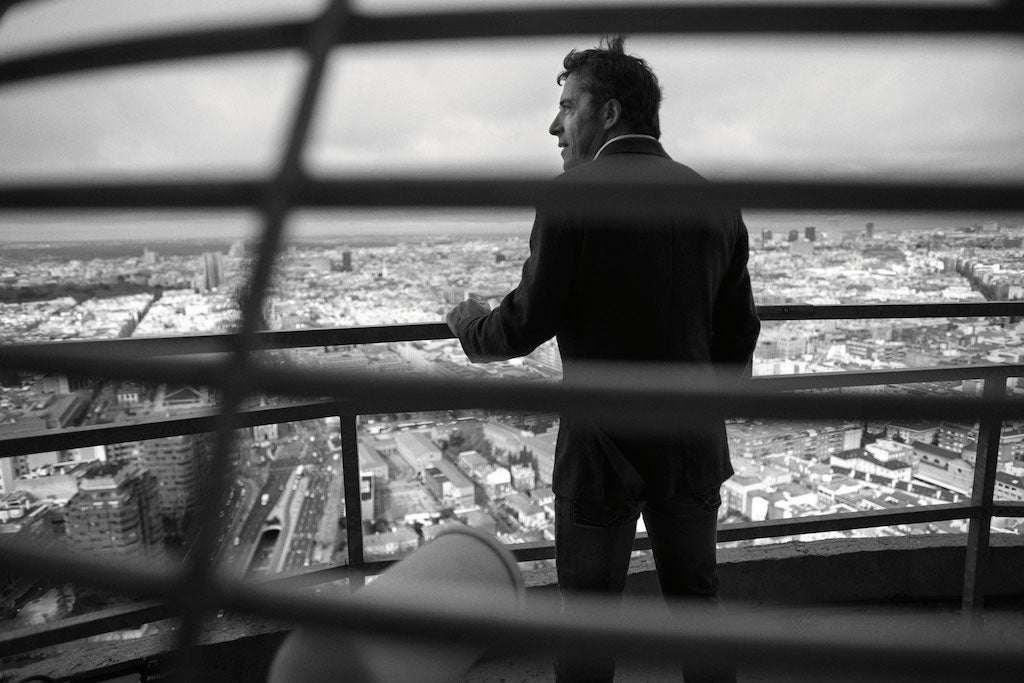
“We all lined up behind Miguel. At the feed station we went through in single file with outstretched hands. Then all hell broke loose. Two kilometres later the group stopped and regrouped for lunch… On the false flats before the Glandon, Arroyo says to Magro, ‘let’s shake things up again’. We had already taken control; we had the power on the stage, which was critical. ‘No one moves a muscle here’, I said.
“We feared the Colombians – Café de Colombia and Postóbon – but they were motionless and that was why I told Magro to push himself as hard as he could, and then Omar, and with just three to go to the top of the Glandon and the Colombians not pulling away, I went for it, and [Steven] Rooks came along so I waited for him.
“The Colombians didn’t control the race, they were sparring a little but when we got to the top they went all-out crazy. Then the unexpected happened. Mottet and Jean François Bernard were sunk, the Colombians had stopped chasing and I thought that I was already home and dry by coming in with Rooks, but right there, on the flat where no one would have seen it coming, the Colombians closed in from behind and the gap, which I thought was going to widen, remained at just one minute. That was our lot. The one time the Colombians team up and they screw us good and proper! But in the end it didn’t make much difference, the race had already been won that day.”
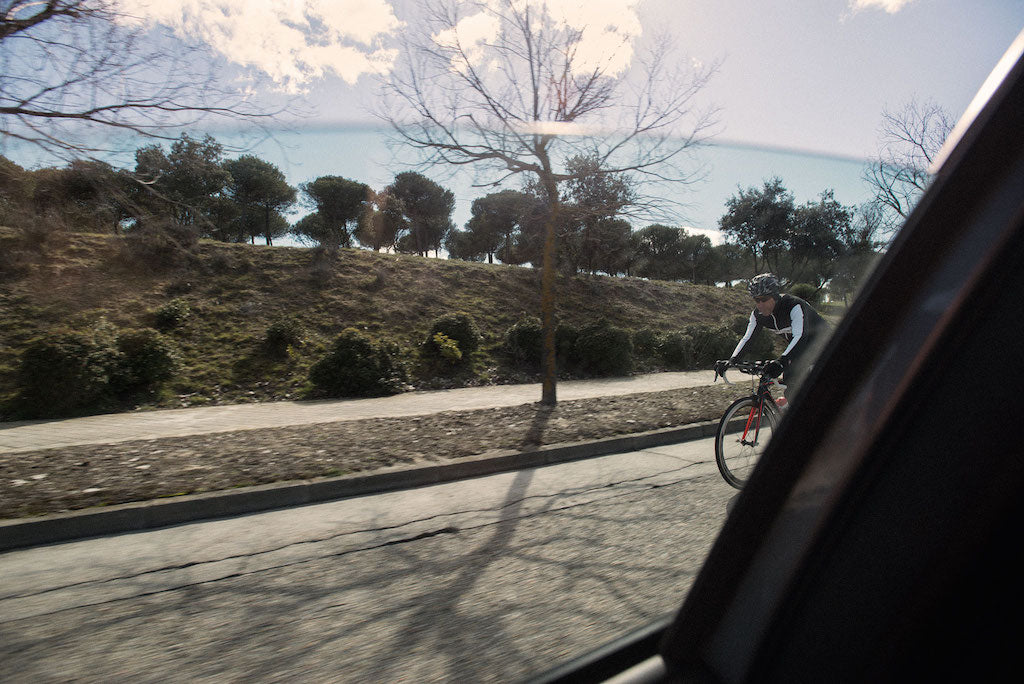
At Alpe d’Huez: 1. Rooks. 2.Theunisse, 17s. 3. Delgado, 4. Parra, 23s. 5. Herrera, 1m 6s.
Overall. 1. Delgado, 2. Bauer, 25s. 3. 3. Parra, 1m 20s. 4. Rooks, 1m 38s. 5. Herrera, 2m 25s.
“I had already taken the yellow jersey the previous year at Alpe d’Huez but I knew that this time I would keep it. I just had to hang in there and enjoy it, and sure enough, the next day, I clinched it on the mountain time trial in Villard de Lans, and that was where we were euphoric,” says Delgado, for whom the moment on the Alpe d’Huez had no more mystical relevance than the realisation of something he’d already anticipated.
For Echavarri it was something else, of course. The team boss, on seeing one of his team with the yellow jersey for the first time, woke up at the crack of dawn to take a walk in the Alpine silence, almost touching the sky with the tips of his fingers, revelling in the sweet communion with nature.
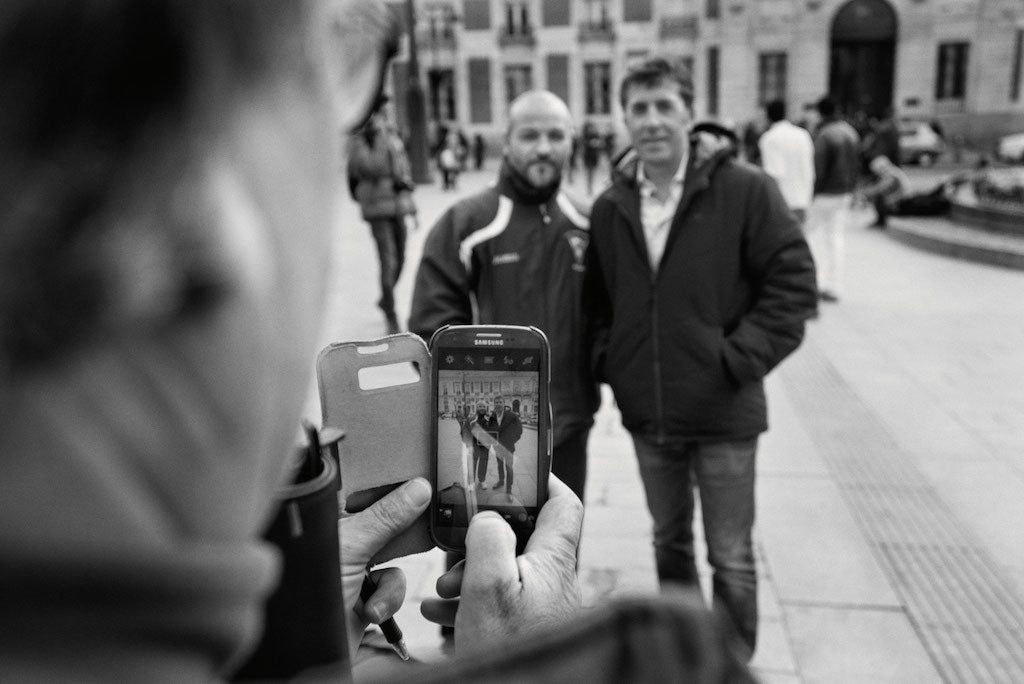
For Perico there was one final character-building chapter left to write in his legendary tale that had caused him so many sleepless nights. All that was left for Perico to do was to become the man who would deliver the knockout blow.
“The height of Perico-mania took place in the Pyrenees,” says Delgado. “The breakaway that everyone remembers was in Luz Ardiden. Cubino won that stage, but most people believe that I won it, although I was third, with Duclos coming in second.
“On TV, the Spanish commentator Pedro Gonzalez was saying that I was done for, that it was all over for me. I had been left alone to face the danger and keep an eye on the Colombians.
“I was waiting for a breakaway to see how I would respond, but I didn’t and neither did they. I saw that they were under control, that the others had just enough strength. People were dropping back one after the other, there would be no attacking.
"I pulled myself together but it still seemed a daunting task so I backed off a little… The battle was for second place, not first, so I stayed on the sidelines. Then, during one of those attacks between Rooks, Theunisse and Lucho, I took advantage, pulled away on the bend and shook them all up. That was the attack that everyone remembers – although contrary to popular belief, I didn’t go on to win the stage.”

Team Cars | Service Des Courses - Organic Unisex T-shirt

Rouleur Team Cars Bone China Mugs

Rouleur ELITE Jet Water Bottle Bidon - 550ml

Rouleur Logo Organic Unisex T-Shirt - Black/White

Team Cars | Campagnolo - Organic Cotton Unisex T-Shirt

Rouleur Logo Organic Unisex T-Shirt – White

Rouleur Logo - Organic Sweatshirt - Unisex - Burgundy

Team Cars | Peugeot - Organic Cotton Unisex T-Shirt

Colours of the Peloton - Short Sleeve Base Layer - Men's

Rouleur Logo Organic Unisex T-Shirt – Tonal Grey

Team Cars | Raleigh - Organic Cotton Unisex T-Shirt

Rouleur Logo Organic Sweatshirt - Unisex - Grey

Coppi - Rouleur Notebook

Rouleur Logo - Organic Sweatshirt - Unisex - French Navy

Rouleur Logo - Organic Hooded Sweatshirt - Unisex - Heather Blue

Rouleur Logo - Organic Jogger Pants - Unisex - French Navy

Rouleur x Kaweco Rollerball Pen - Black + Gold foil logo

Allez - Organic Cotton Unisex T-Shirt

Tours Issue - Rouleur Tote Bag

Dai! - Organic Cotton Unisex T-Shirt

True Grit - Rouleur Notebook

Rouleur Water Bottle Bidon - Ride Fast, Read Slow - Cream + Green

Rouleur Water Bottle Bidon - Green + Pink

Rouleur x Kaweco Rollerball Pen - Brass + Black etched logo

Rouleur Embroidered Organic Cotton Unisex T-Shirt - Natural Cotton + Green

!Vamos! - Organic Cotton Unisex T-Shirt

Colours of the Peloton - Short Sleeve Jersey - Women's

Rouleur Logo Women's T-Shirt - Navy

Rouleur x Kaweco Aluminium Rollerball Pen - Silver + Engraved logo

Rouleur Logo - Organic Jogger Pants - Unisex - Heather Grey
PEDRO DELGADO: RIDER PROFILE
- Sign up to our newsletter Newsletter
Career profile>> ? Results>> ? Photos>>
PEDRO DELGADO
Date of birth: 15/04/60
From: Segovia, Spain
Teams: Banesto (1990-1994), Reynolds (1988-1989), PDM (1986-1987), MG-Seat-Orbea (1985), Orbea (1984), Reynolds (1982-3)
Pedro Delgado career profile
Talented climber Pedro Delgado was Spain?s third ever winner of the Tour de France [in 1988] as well as a double winner of the Tour of Spain.
Famous for his explosive attacks in the high mountains, Delgado?s ding-dong battle with Stephen Roche in the 1987 Tour was one of the most memorable of the decade. Delgado lost the race in the final time trial.
Other high points of Delgado?s career include a controversial victory in the 1985 Vuelta, where the Segovia-born pro wrenched the overall win from Scotland?s Robert Millar thanks to an alliance between the Spanish teams and the incompetence of Millar?s directeur sportif of the time.
Get The Leadout Newsletter
The latest race content, interviews, features, reviews and expert buying guides, direct to your inbox!
His Tour win in 1988 was also clouded in controversy after Delgado tested positive during the race for probecenid, a substance banned by the International Olympic Committee but not by the UCI.
After taking a second Vuelta win in 1989, Delgado was increasingly overshadowed by the rise of team-mate Miguel Indurain. After several years as Indurain?s domestique de luxe - and two more podium places in the Vuelta - he retired in 1994.
Search for news stories on Pedro Delgado
Pedro Delgado results
Tour of Spain, third overall
Catalan Week, stage and overall
Tour of Spain, sixth overall
Tour de France, ninth overall.
Tour of Spain, third overall and stage
Tour de France, sixth overall
Tour of Burgos, stage and overall
Subida a Urkiola
Vuelta a los Puertos
Tour de France, ninth overall
Tour de France, fourth overall
Tour of Spain, second overall
Tour of Spain, three stages and overall
Tour de France, third overall
Tour de France, stage and overall
Tour of Italy, seventh
Tour de France, stage and second overall
Tour of Spain, fourth overall
Tour de France, stage
Tour of Spain, tenth overall
Tour de France, stage and sixth overall
Tour of Spain, stage and overall
Tour of Aragon, stage and overall
Tour of the Mining Valleys, stage
Tour of Cantabria, stage (sector)
Zaragoza - Sabiñanigo
Trofeo de Avila
Pedro Delgado photos
Click on the thumbnails of Pedro Delgado below to open a larger image in a new window.
RELATED LINKS
Cycling Weekly's Rider Profiles: Index
Thank you for reading 20 articles this month* Join now for unlimited access
Enjoy your first month for just £1 / $1 / €1
*Read 5 free articles per month without a subscription
Join now for unlimited access
Try first month for just £1 / $1 / €1
Founded in 1891, Cycling Weekly and its team of expert journalists brings cyclists in-depth reviews, extensive coverage of both professional and domestic racing, as well as fitness advice and 'brew a cuppa and put your feet up' features. Cycling Weekly serves its audience across a range of platforms, from good old-fashioned print to online journalism, and video.
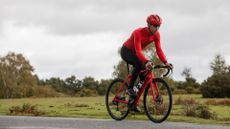
Get into cycling, get fitter, or ride faster with our cycling training plans
By Anna Marie Abram Published 22 April 24
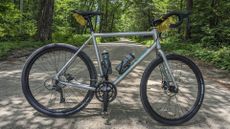
American gravel and mountain bike brand will "continue to seek a buyer"
By Adam Becket Published 22 April 24
Useful links
- Tour de France
- Giro d'Italia
- Vuelta a España
Buyer's Guides
- Best road bikes
- Best gravel bikes
- Best smart turbo trainers
- Best cycling computers
- Editor's Choice
- Bike Reviews
- Component Reviews
- Clothing Reviews
- Contact Future's experts
- Terms and conditions
- Privacy policy
- Cookies policy
- Advertise with us
Cycling Weekly is part of Future plc, an international media group and leading digital publisher. Visit our corporate site . © Future Publishing Limited Quay House, The Ambury, Bath BA1 1UA. All rights reserved. England and Wales company registration number 2008885.
- Tour de France
- Giro d'Italia
- La Vuelta ciclista a España
- World Championships
- Milano-Sanremo
- Amstel Gold Race
- Tirreno-Adriatico
- Liège-Bastogne-Liège
- Il Lombardia
- La Flèche Wallonne
- Paris - Nice
- Paris-Roubaix
- Volta Ciclista a Catalunya
- Critérium du Dauphiné
- Tour des Flandres
- Gent-Wevelgem in Flanders Fields
- Clásica Ciclista San Sebastián
- UAE Team Emirates
- Arkéa - B&B Hotels
- Astana Qazaqstan Team
- Alpecin-Deceuninck
- Bahrain - Victorious
- BORA - hansgrohe
- Decathlon AG2R La Mondiale Team
- EF Education-EasyPost
- Groupama - FDJ
- INEOS Grenadiers
- Intermarché - Wanty
- Lidl - Trek
- Movistar Team
- Soudal - Quick Step
- Team dsm-firmenich PostNL
- Team Jayco AlUla
- Team Visma | Lease a Bike
- Grand tours
- Top competitors
- Final GC favorites
- Stage profiles
- Riders form
- Countdown to 3 billion pageviews
- Favorite500
- Profile Score
- Statistics by season
- World map of rider races
- Most starts by race
- Starts and results
- Injury history
- Contribute info
- Submit program
- Contribute sites / social media
- Embed rider results
- Top GC results
- Overview - Overview
- Statistics - Statistics
- Results - Results
- Calendar - Calendar
- More - More
- Specialties - Specialties
Pedro Delgado
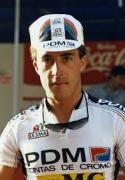
Points per specialty
- 1881 Onedayraces
- 2522 Sprint
- 5816 Climber
- All time 111
- Visits: ▼318 this week
Top results
- GC Tour de France ('88)
- 2x GC La Vuelta ciclista a España ('89, '85)
- 4x stage Tour de France ('88, '87, '86, '85)
- 5x stage La Vuelta ciclista a España ('92, '89, '85)
- 2nd GC Tour de France ('87)
- GC Setmana-Catalana ('93)
- 8x 2nd stage Tour de France ('92, '90, '89, '83)
- GC Vuelta Aragón ('83)
- GC Vuelta a Burgos ('91)
- 2x 2nd GC Volta Ciclista a Catalunya ('91, '89)
- 2nd GC La Vuelta ciclista a España ('90)
- Urkiola Igoera - Subida Urkiola ('91)
- 1994 Banesto
- 1993 Banesto
- 1992 Banesto
- 1991 Banesto
- 1990 Banesto
- 1989 Reynolds - Banesto
- 1988 Reynolds
- 1987 PDM - GIN MG - Ultima - Concorde
- 1986 PDM - Concorde
- 1985 Seat - Orbea as from 01/07
- 1984 Reynolds
- 1983 Reynolds
- 1982 Reynolds - Galli
Key statistics
- 25 Wins GC (6) Oneday races (5) ITT (3)
- 24 Grand tours tour (11) giro (2) vuelta(11)
- 12 Classics RBX(0) MSR(5) RVV(0) LBL(6) LOM(1)
PCS Ranking position per season
Grand tours.
- Vuelta a España
Major Tours
- Volta a Catalunya
- Tour de Romandie
- Tour de Suisse
- Itzulia Basque Country
- Milano-SanRemo
- Ronde van Vlaanderen
Championships
- European championships
Top classics
- Omloop Het Nieuwsblad
- Strade Bianche
- Gent-Wevelgem
- Dwars door vlaanderen
- Eschborn-Frankfurt
- San Sebastian
- Bretagne Classic
- GP Montréal
Popular riders
- Tadej Pogačar
- Wout van Aert
- Remco Evenepoel
- Jonas Vingegaard
- Mathieu van der Poel
- Mads Pedersen
- Primoz Roglic
- Demi Vollering
- Lotte Kopecky
- Katarzyna Niewiadoma
- PCS ranking
- UCI World Ranking
- Points per age
- Latest injuries
- Youngest riders
- Grand tour statistics
- Monument classics
- Latest transfers
- Favorite 500
- Points scales
- Profile scores
- Reset password
- Cookie consent
About ProCyclingStats
- Cookie policy
- Contributions
- Pageload 0.1080s

- Buyer’s Guide
- Gear Reviews
- Rides+Events
- Training Guide
- Maintenance

That time the defending Tour de France champ was 2 minutes late to the prologue
Pedro delgado had the worst possible start to the 1989 tdf.
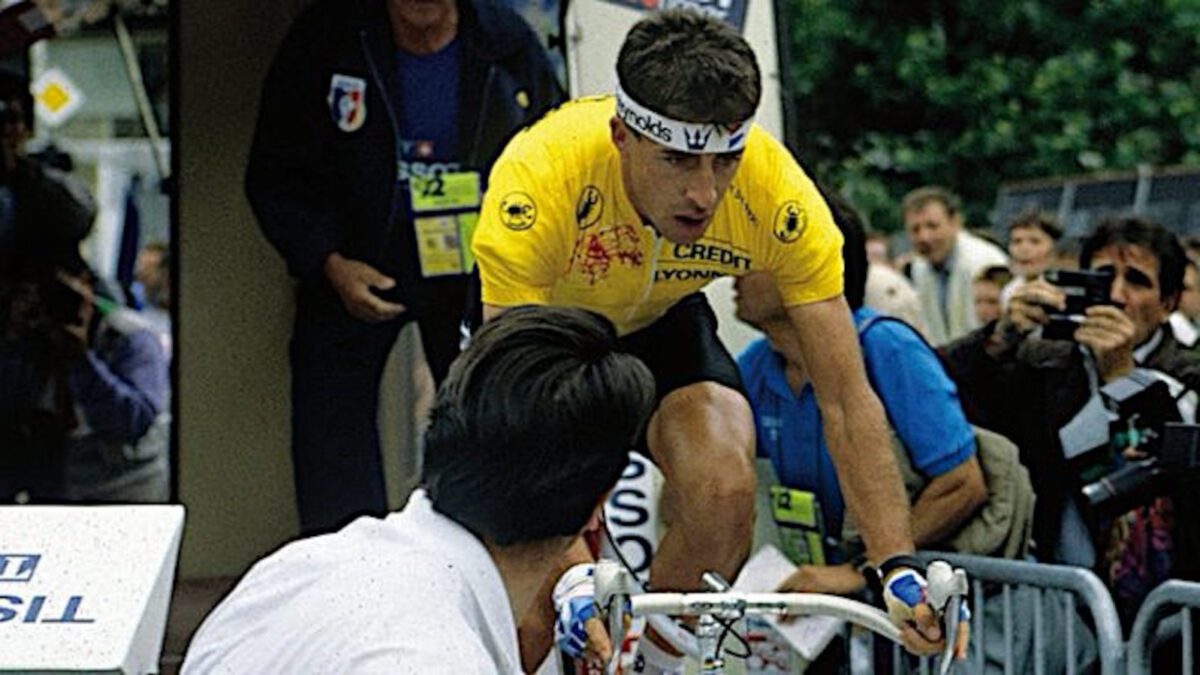
The prologue in 1989 was a disaster for Spanish rider, Pedro Delgado. Delgado finished the first day of the race, a 7.8 km time trial in Luxembourg, 2’54” down on the winner, Dutchman Erik Breukink. Laurent Fignon, who would ultimately finish second by just eight seconds, was second, with Greg LeMond slotting in at fourth. Canada’s Steve Bauer had a super ride as well, coming in fifth. Delgado would finish in dead last, and would win the infamous honour of being the first (and probably the last) defending champion to do so. Delgado was riding for the Reynolds team, which is now known as Movistar.
Delgado was considered a huge favourite to repeat in 1989, and the sight of him running up the stairs of the start house to jump on his bike as officials panicked, was surreal. Delgado, a.k.a “Perico” signed into the race with 20 minutes to spare, and headed off to complete his warm-up. When he was out doing some openers, he somehow lost track of time. Race officials were bewildered and fans were panicking.
Review of ‘The Comeback: Greg LeMond, the True King of American Cycling, and a Legendary Tour de France’
Finally, the Spanish rider showed up., two minutes and 40 seconds late for his start. As the race progressed however, Delgado would take some big chances in stages, since he was no longer a favourite and claw back some time.
Ultimately, Perico would finish on the podium in third position, 3’34” behind LeMond.
Check out this video of the frantic start for him at the ‘89 Tour.

- Email address: *
- Phone This field is for validation purposes and should be left unchanged.
Cookie banner
We use cookies and other tracking technologies to improve your browsing experience on our site, show personalized content and targeted ads, analyze site traffic, and understand where our audiences come from. To learn more or opt-out, read our Cookie Policy . Please also read our Privacy Notice and Terms of Use , which became effective December 20, 2019.
By choosing I Accept , you consent to our use of cookies and other tracking technologies.

Follow Podium Cafe online:
- Follow Podium Cafe on Twitter
- Follow Podium Cafe on Facebook
Site search
- Tour de France
- Cafe Bookshelf
- Women’s Cycling
- FSA Directeur Sportif
- Full Archive
- DraftKings Nation
- Community Guidelines
Filed under:
A Life on the Pedals, by Pedro Delgado
Share this story.
- Share this on Facebook
- Share this on Twitter
- Share this on Reddit
- Share All sharing options
Share All sharing options for: A Life on the Pedals, by Pedro Delgado
/cdn.vox-cdn.com/uploads/chorus_image/image/63899839/Pedro_Delgado.0.jpg)
Title: A Life on the Pedals Author: Pedro Delgado (with Julián Redondo, translated by Toni Fernández and Adrian Bell) Publisher: Mousehold Press Year: 2019 (originally published in Spanish in 1995) Pages: 225 Order: Mousehold What it is: The 1995 autobiography of Pedro Delgado, one-time winner of the Tour de France, two-time victor at the Vuelta a España Strengths: It offers a sometimes engaging glimpse into life in the eighties peloton Weaknesses: Like most all chamoirs, it hides more than it shows
Seven Spanish riders have won the Tour de France: Federico Bahamontes 1959; Luis Ocaña 1973; Pedro Delgado 1988; Miguel Indurain 1991-1995; Óscar Pereiro 2006; Alberto Contador 2007, 2009, 2010 ; and Carlos Sastre 2008. Bahamontes, he has a workmanlike English-language biography, from Alasdair Fotheringham . Ocaña, he has a rather wonderful biographical novel from Carlos Arribas and a rather dull biography from Fotheringham . Indurain, he has biographies by Pablo Muñoz, Javier García Sánchez, Sam Abt, and Fotheringham . And now Pedro Delgado becomes the fourth Spanish Tour winner to have the story of his career made available for English-speaking cycling fans.
Originally published in 1995 shortly after his retirement from the professional ranks – and with a small update later to take in the retirement of Indurain – A Life on the Pedals is less an autobiography and more an authorised biography. Sort of like Cadel Evans’s Close to Flying , only without the rancour between the guy with his name on the cover and the guy who actually did the writing. Julián Redondo, a well known Spanish cycling journalist, tells the story in workmanlike fashion, with Delgado quoted extensively offering his take.
:no_upscale()/cdn.vox-cdn.com/uploads/chorus_asset/file/16300716/984947798.jpg.jpg)
Given Delgado’s rather barren palmarès – the Vuelta a España in 1985, the Tour de France in 1988, the Vuelta again in 1989, making his the Monument Valley of cycling careers, impressive but windswept – this is a book padded out a little, sort of like Geraint Thomas’s The World of Cycling According to G . Here, you get chapters about astrology (“We grab hold of things to give ourselves some necessary security or confidence in what we can do, especially in critical moments.”), journalists who’ve pissed Delgado off (he really doesn’t like José María García, going back to a perceived slight early in his career), and bonking (Delgado was known for his pájaras , physical collapses brought about by not eating when or what he should).
:no_upscale()/cdn.vox-cdn.com/uploads/chorus_asset/file/16300721/1571203.jpg.jpg)
One of the more enjoyable aspects of A Life on the Pedals is the none too subtle stiletto Delgado sometimes wields. Here he is on Greg LeMond in the 1989 Tour :
“This year I proved what I had believed was impossible – that one can win the Tour without a team, purely by having the luck of the devil. I am talking about LeMond. First, there was the disastrous departure of one of the other a priori favourites; that’s to say, me. After that came the involuntary collaboration, of different riders, according to how the race demanded it. At one time it was the PDM; at other times it was me, and for sure there were others on more occasions than I remember. The result was that on the final stage, an individual time trial over 25 kilometres into Paris and with Laurent Fignon in the yellow jersey, the American pulled off the impossible: in one fell swoop he won the time trial and the race overall. It was the only day that Greg LeMond merited winning the Tour.”
Or take the 1987 Tour, the stage to La Plagne. The race was in its final stages and Delgado was in the maillot jaune . But with the penultimate day’s ITT favouring Stephen Roche , Delgado was seen as just keeping the jersey warm unless he could put some time into his rival on the final summit finish of the race. Here he is at the base of that climb:
“Roche has three domestiques de luxe at his disposal: [Eddy] Schepers, his Carrera team mate, [Luciano] Loro from Del Tongo and the Peugeot rider, [Denis] Roux, a Frenchman who just happened to be passing that way. Both Loro and Roux led for a good part of the climb – and not just on that day; they had worked for him some days earlier, and would do so again later. They did an important job in maintaining a strong pace without taking the Irishman beyond his limits.
“Schepers and the allies, Loro and Roux, were setting the pace for Roche, while ensuring that I didn’t get too far ahead. Many fans told me that they saw Roche being pulled up the climb. I obviously didn’t see it, nor do I know whether it was a momentary thing or something more. I am not going to get into that; there are race judges to deal with these things; even so, he must have done something, because he was given a small fine, for a feeding offence.
“However, what did me the most harm was the collaboration offered to him by riders from other teams. Because of them the time that I was so hoping to put into Roche almost went the other way. In the end I managed to take a miserable four seconds from him. That day, he won the Tour, in spite of the television images of him lying unconscious immediately after crossing the finish line.”
Talk about throwing shade. That’s almost Roche-like in its delivery.
Were one of a Romantic nature, one might imagine Delgado to have been a rider cursed by the Fates: a man allowed to taste victory but not enjoy it. His 1985 Vuelta win , that came in controversial circumstances on the penultimate day’s racing, when a Spanish alliance put Philippa York (née Robert Millar) to the sword, the Scot leading the race and looking like the certain victor until things went awry and Delgado pulled off a come back from the dead comparable to that of Lazarus. Then there was the 1988 Tour and the ‘positive’ for probenecid, a drug banned by the IOC but not the UCI. Or the 1989 Vuelta and the envelope exchanged with Alfa Lum’s Sergei Ivanov the day after the Russian had helped Delgado see off an attack from Colombian rival Fabio Parra. Every win, a controversy.
While those three wins are the high points of A Life on the Pedals , the real delight of the book is in the other stories told. Often forgotten, for instance, is that Delgado rode the 1988 Giro d’Italia, the one with Andy Hampsten’s victory and the snow on the Gavia:
“On the way down I witnessed scenes that I could never have imagined: there were riders who had left their bike at the roadside and were running on foot in the opposite direction, simply to get some warmth into their bodies; others were stamping on the road, or beating themselves all over with their hands to fight off the terrible cold. As for me, I was almost fainting, and I didn’t know whether what I was seeing while I shivered violently was real, or a product of my imagination. I came out of one curve and I found a French rider coming in the opposite direction: he was going up while we were going down. I tried to bring myself round because I was starting to have hallucinations, I was so cold. Did I take the right crossing? It was Dantesque!
“The scene didn’t seem real, but anything goes when you are fighting such cold. Some just poured the can of hot tea all over themselves. Others sought to lessen the effects of the cold by peeing on themselves. In an extreme situation – and this certainly was – it’s a case of anything that helps...”
In the two decades that have passed since this book was originally published, the world of cycling has changed. Today, reading about riders pissing themselves to keep warm, that feels like another world, way, way way back in the past. But consider this: Delgado’s mishap at the 1989 Tour, when he lost more than two and a half minutes in the opening prologue before he’d even started, that was down to him warming up before the ride, something modern cycling journalism tells us wasn’t invented until Team Sky came along. Or consider the fact that the team that Delgado turned professional with, and won the Tour with, is still going strong today: it was Reynolds then, and later became Banesto, and after that Caisse d’Epargne, today it’s Movistar. This may well be history, but its actually quite recent history.
:no_upscale()/cdn.vox-cdn.com/uploads/chorus_asset/file/16300702/Pedro_Delgado___Tour_de_France___1983.jpg)
One should also consider that, back then, riders were a bit more open, a lot more critical. Delgado, like Freddy Maertens , he’s not shy about complaining about how much he had to pay in taxes (“you are left with the feeling they have taken away our money and our sacrifices, all at the same time”). Today’s globe-trotting tax dodgers, they won’t even go there (with the notable exception of David Millar , who used his tax woes as a way of getting you to feel sorry for him): Lizzie Deignan , Chris Froome , they tell you they’re living in tax exile cause the training is better. Delgado, in a lot of areas, he’s a lot less guarded than many modern chamoirs. This is a lot less polished than most recent autobiographies, and a lot better for that fact.
That said, let’s be honest about something: there’s a lot not being told here. Take Delgado’s first Grand Tour, the 1982 Vuelta. It gets mentioned several times. But if Delgado mentioned the fact that his team leader Ángel Arroyo was stripped of victory within days of the race end, having tested positive, then it must have been when I was blinking. Or how about Delgado’s time with PDM? A decent biography of Delgado – a proper one, not a fawning affair like Fotheringham’s recent Indurain hagiography – would talk about what the Spaniard really learned there, would talk about the role blood transfusions were playing in the sport at that time and the possibility that Delgado’s 1988 probenecid positive was what Tyler Hamilton has referred to as an echo positive , a tainted blood bag. But here ... well, like so many others from that era, Delgado is hiding a lot behind his enjoyable anecdotes.
The anecdotes, they are enjoyable: there’s team-mate Javier Lukin being stripped naked by the Giro’s podium girls, there’s a story about waking up in a panic in a car and thinking the driver had nodded off only to find he’s parked up, there’s a tale about losing a yellow jersey at a post Tour party. Many of the more serious stories told by Delgado have already been mined by others over the years and will be familiar from books like Viva la Vuelta and Slaying the Badger , the less familiar stories, the ones that offer a glimpse behind the curtain of 1980’s cycling, they’re now the real joy of A Life on the Pedals.
:no_upscale()/cdn.vox-cdn.com/uploads/chorus_asset/file/16300700/Pedro_Delgado___Covers.jpg)
More From Podium Cafe
- Tour de Romandie LIVE
- Liège-Bastogne-Liège LIVE
- Tour of Türkiye LIVE
- Fléche Wallonne LIVE
- Tour of the Alps LIVE
- Spring Classics Midterm Grades... Don’t Ask
Cycling Passion
a passion, an emotion, a sport
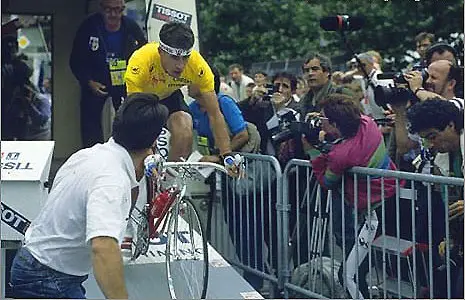
Missing the Tour de France Start
Pedro Delgado , the defending champion, missed his start time with 2:40 at the prologue at the start of the 1989 Tour de France . Delgado covered the distance only 14 seconds slower than Erik Breukink , the stage winner. But adding the 2 minutes and 40 seconds at his time, he became the only defending champion to begin the race in last place, 2:54 behind Breukink.
Greg LeMond surprised by placing fourth in the opening prologue. Laurent Fignon was second, Sean Kelly third with all three finishing six seconds behind the winner on the day, Erik Breukink. Delgado ended the first day of the race placed last of the 198 riders.
As Delgado admitted later, that night he was very nervous and did not sleep.
The following day there were two stages. The second stage was a decisive team time-trial.
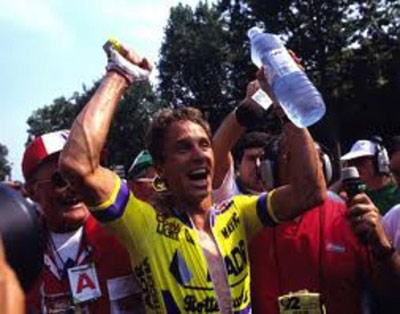
Related: Eight seconds
At the first stage, Delgado dropped, and his team did not wait him. He lost additionally 4:32. He was very weak and suffered hypoglycemia in the second stage. So after the second stage of the day, he was still at the last place in the general classification, more than seven minutes behind the best-classified of the favorites, Frenchman Laurent Fignon .
Delgado rode the rest of the race very aggressively. His reaction started in the 5th stage, a 73 km individual time-trial. He was second in the stage, 24 seconds behind Greg LeMond . In the first mountain stage, Delgado attacked during the last climb, gaining 29″, but in the next stage Delgado, together with Robert Millar , finished 3:26 ahead of Fignon and 3:38 ahead of Lemond.
Delgado was now 4th overall, 2:53 behind the leader, Fignon. After the 17th stage, finishing in the famous Alpe d’Huez, final victory still seemed to be possible, he was third overall, 1:55 behind Fignon and 1:29 behind Lemond. But he was too tired after riding so aggressively stage after stage, Delgado exhausted, was unable to make up all the time he had lost in the early stages.
The final of 1989 Tour de France was a epic battle between Laurent Fignon and Greg Lemond : Before the final time trial stage, Fignon was 50 seconds ahead of LeMond, but LeMond won by 8 seconds , it was the closest finish to a Grand Tour in cycling history.
Delgado finished the Tour in third place, 3:34 behind LeMond.
Video of Pedro Delgado’s missing the Tour de France start @7:35.
- Recent Posts
- Top 18 fastest Paris-Roubaix editions - April 7, 2024
- Col de Tourmalet [Amazing photo from the 1953 Tour de France] - January 11, 2024
- Bernard Hinault and Francesco Moser, 1981 Paris-Roubaix - December 8, 2023
Leave a comment
Cancel reply.
Your email address will not be published. Required fields are marked *
This site uses Akismet to reduce spam. Learn how your comment data is processed .
Report: seven out of eight PDM riders doped at 1988 Tour de France
Volksrant uncovers former soigneur's notebook
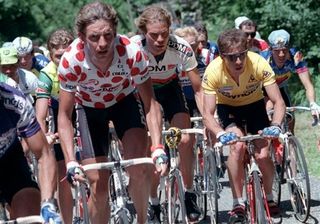
A Dutch newspaper has alleged that seven of the eight riders on the PDM team at the 1988 Tour de France were using banned substances. Volksrant has published extracts from the notebook used by soigneur Bertus Fok during the race, in which he details the substances administered to the riders.
Doping was a way of life at Rabobank, says Thomas Dekker
Lotz confirms doping at Rabobank, Wauters denies it
According to Volksrant , Fok confirmed the authenticity of the ring-bound, team-branded notebook during an interview at his home recently. Fok, who began his career as a soigneur with Peter Post’s TI-Raleigh team, joined PDM in 1986.
Volksrant alleges that Fok was “directly responsible for the medical policy – the doctors did not make their appearance until some years later in cycling.”
Fok’s notebook, photographs of which are published on the Volksrant website , provides details of the substances he administered to his riders during the Tour. The substances and practices used by PDM riders on the race allegedly include testosterone, corticosteroids and blood transfusions. It remains unclear whether EPO was in use in the peloton as early as 1988, but Fok said that he did not administer it at PDM.
“I never occupied myself with EPO. That was too much for me,” Fok said.
PDM’s best finisher in the 1988 Tour was Steven Rooks, who came second overall behind Pedro Delgado, won on l’Alpe d’Huez and claimed the king of the mountains title. Rooks confessed to doping throughout his career in 1999.
Gert-Jan Theunisse - who had finished second behind Rooks at l’Alpe d’Huez - tested positive for testosterone during the 1988 Tour and was handed a ten-minute penalty, which relegated him from 4th to 11th place overall. In 1999, Theunisse confessed to using corticosteroids during his career but denied that he had used testosterone during the 1988 Tour.
Get The Leadout Newsletter
The latest race content, interviews, features, reviews and expert buying guides, direct to your inbox!
Fok explained that Theunisse held a medical certificate to use corticosteroids. “Not everything could be detected then,” Fok said.
The PDM team, which operated between 1986 and 1992, was also embroiled in controversy during the 1991 Tour, when the entire team abandoned the race during the opening week , citing illness. A bacterial infection was initially blamed for the so-called "Intralipid Affair" and, later, the use of the fat emulsion intralipid, although speculation concerning the team’s use of doping products has always been rife. Speaking of the affair in 1997, then manager Manfred Krikke said, “The one rule imposed from the PDM directors was that there was to be ‘no drug affairs’ rather than ‘no drug taking.’”

Thank you for reading 5 articles in the past 30 days*
Join now for unlimited access
Enjoy your first month for just £1 / $1 / €1
*Read any 5 articles for free in each 30-day period, this automatically resets
After your trial you will be billed £4.99 $7.99 €5.99 per month, cancel anytime. Or sign up for one year for just £49 $79 €59

Try your first month for just £1 / $1 / €1
How to watch the 2024 Giro d'Italia
'Like a second family' - Jai Hindley signs contract extension with Bora-Hansgrohe
Tour de Romandie: Godon and Vendrame go 1-2 for Decathlon AG2R on stage 1
Most Popular
El Mazo De Perico
Disfrutando del ciclismo y del deporte
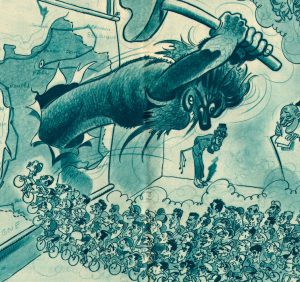
Tour de Francia 2023. Recorrido
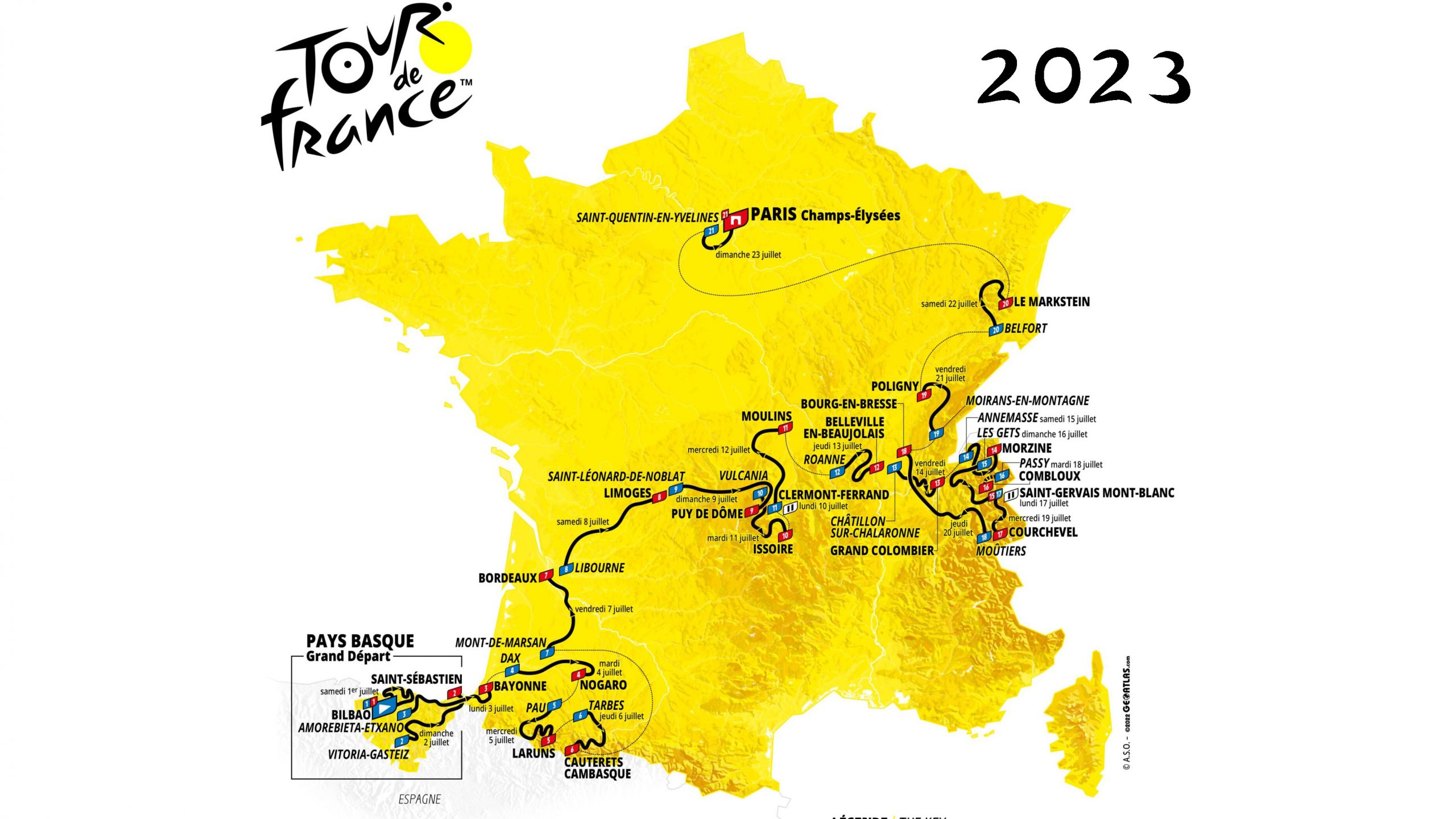
Pedro Delgado
- Tour de Francia
Mi análisis del recorrido del Tour de Francia 2023, presentado el 27 de octubre 2022. Mucha montaña y solo 22 kilómetros de contra reloj.
- Coronavirus
- El Mazo de Perico
- Giro de Italia
- La Vuelta a España
- Pericopuertos
- Pericopuertos 2023
También te puede interesar…
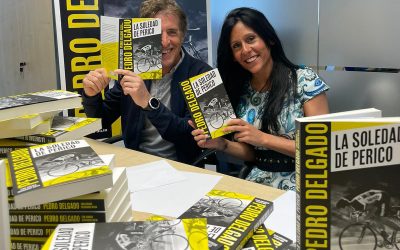
La Soledad de Perico
por Pedro Delgado | Ago 16, 2023 | Giro de Italia , La Vuelta a España , Tour de Francia
Estoy casi hecho un Lope de Vega, os presento mi cuarto libro 'La Soledad De Perico'. Como no soy capaz de hacerlo solito, me he buscado una ayuda...
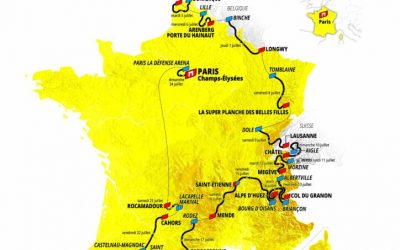
Tour de Francia 2022 presentacion
por Pedro Delgado | Nov 4, 2021 | Tour de Francia
Aprovechando mi presencia en L'Etape de Granada 2021 by Le Tour de Francia, Iñigo Zubeldía (@Inigo_Zubeldia) me hizo la siguiente entrevista donde...
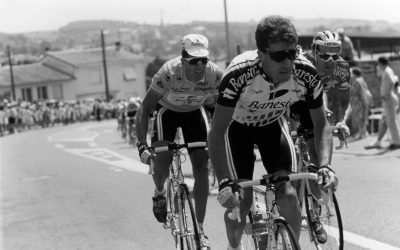
Tour de Francia 1993. Pau. Directo Twitter.
por Pedro Delgado | Abr 20, 2020 | Ciclistas , Podcasts , Tour de Francia
Directo en Twitter después de la remisión en Teledeporte del final de la 17ª etapa con llegada a Pau @LeTour 1993, en plena hegemonía de Idurain, para hablar de esa edición y más cosas.
- Preplanned tours
- Daytrips out of Moscow
- Themed tours
- Customized tours
- St. Petersburg
Moscow Metro
The Moscow Metro Tour is included in most guided tours’ itineraries. Opened in 1935, under Stalin’s regime, the metro was not only meant to solve transport problems, but also was hailed as “a people’s palace”. Every station you will see during your Moscow metro tour looks like a palace room. There are bright paintings, mosaics, stained glass, bronze statues… Our Moscow metro tour includes the most impressive stations best architects and designers worked at - Ploshchad Revolutsii, Mayakovskaya, Komsomolskaya, Kievskaya, Novoslobodskaya and some others.
What is the kremlin in russia?
The guide will not only help you navigate the metro, but will also provide you with fascinating background tales for the images you see and a history of each station.
And there some stories to be told during the Moscow metro tour! The deepest station - Park Pobedy - is 84 metres under the ground with the world longest escalator of 140 meters. Parts of the so-called Metro-2, a secret strategic system of underground tunnels, was used for its construction.
During the Second World War the metro itself became a strategic asset: it was turned into the city's biggest bomb-shelter and one of the stations even became a library. 217 children were born here in 1941-1942! The metro is the most effective means of transport in the capital.
There are almost 200 stations 196 at the moment and trains run every 90 seconds! The guide of your Moscow metro tour can explain to you how to buy tickets and find your way if you plan to get around by yourself.
2-FOR-1 GA TICKETS WITH OUTSIDE+
Don’t miss Thundercat, Fleet Foxes, and more at the Outside Festival.
GET TICKETS
BEST WEEK EVER
Try out unlimited access with 7 days of Outside+ for free.
Start Your Free Trial
Powered by Outside
A conversation with Pedro Delgado – Part II
You may not agree with him, but you can't accuse 1988 tour de france winner pedro delgado of being shy about stating his opinions regarding the sport in which he made his living. now a cycling commentator for spanish national television, delgado still works in and around cycling and he often doesn’t like what he sees. in this the second of a two-part interview with velonews contributor martin hardie, delgado discusses the dynamics of a sport long dominated by a pair of dominant riders – miguel indurain and lance armstrong – and of the doping scandals now enveloping the upper reaches of.
Heading out the door? Read this article on the new Outside+ app available now on iOS devices for members! >","name":"in-content-cta","type":"link"}}'>Download the app .
By Martin Hardie

Photo: Agence France Presse (file photo)
You may not agree with him, but you can’t accuse 1988 Tour de France winner Pedro Delgado of being shy about stating his opinions regarding the sport in which he made his living. Now a cycling commentator for Spanish national television, Delgado still works in and around cycling and he often doesn’t like what he sees.
In this the second of a two-part interview with VeloNews contributor Martin Hardie, Delgado discusses the dynamics of a sport long dominated by a pair of dominant riders – Miguel Indurain and Lance Armstrong – and of the doping scandals now enveloping the upper reaches of the peloton.(See Part One of a conversation with Pedro Delgado
PD: I told Oscar that he had to attack going downhill and win going downhill, not just going uphill! In the era of Armstrong or Indurain, in a time when you have a great dominator, their rivals often think that because he was always a better climber or a better time trialist, the race was over from the start. That’s a fallacy.
In cycling there are the downhills as well. The race is in the feed zones, on the downhills, these are the places to attack. In my time, we lived under a constant tension; the race was always on the edge. Laurent Fignon would attack in the feed zones, he would always try to fan the race out in the wind by making echelons, and he would attack on any day. Stephan Roche was another. He was one that would often attack going downhill. Everyone and anyone would attack at any time and at any place.
Now this is not the case. It is like a rule that has been established – you make your time in the time trials or in climbing the mountains, and the rest of the race is simply of no interest to the greats, to those who are in contention.
So I said to Oscar “Hey, no one is attacking!”
Most people who know cycling well think that in recent times that it was Ullrich who was the strongest, that he was a better racer than Lance Armstrong. But why did Armstrong always win over Ullrich? Because of the head – he had a better head.
“You might beat me here or there,” he would say, but he always had the better head. Ullrich is very linear. He thought that Armstrong was better in the time trials and in the mountains. That’s why Ullrich always thought of himself as the runner up. If he attacked it was going uphill, but why not going down? Why not 80 kilometers from the finish? A rider as strong as Ullrich can do that. Why didn’t he do it?

Photo: PhotoSport International (file photo)
So, I spoke to Oscar and I said “the mountains are very long going up, but they are also very long going down. I don’t think anyone is going to attack going up the mountains, so take the advantage on the descents. Get yourself a teammate on the front and go strong and very hard downhill, and you sit behind him and eat and drink, just worry about that, eating and drinking.”
Often, this is the key and for this reason it makes people angry as well. For example in the time of Indurain, Claudio Chiappucci was the rider that liked to attack on the descents, and it was always without warning. On the other hand, his great rival, Gianni Bugno, always gave up, such that if after the first time trial Indurain had a one-minute advantage, Bugno essentially conceded the race. That’s why the Tour de France was as predictable as it was in the time of Indurain and Armstrong. Riders often surrendered after the first time trial. There was no reason to allow that to happen.
Oscar is a rider who loves to attack, who thrives on this style of cycling. That’s why I told him what I did.
“Oscar take advantage of the descents on the mountains because tomorrow (Stage 16) they are much more important and crucial than the climbs,” I told him.
This was the day that Landis cracked.
VN: So we now know the story, or we saw the initial results, with Oscar and his team driving so hard on the descents, Landis didn’t have time to eat and then cracked on the final climb. Is the start of a change in cycling? Are we going to see more of that in the future?
PD: In cycling, the champion — the patron — sets the style of racing. We are at a point where the peloton has no real patron, and so we don’t know what the style of racing will be. There is no patron to place his mark on the peloton through his style. In the time of Pantani, or in my time, we tried to make time, to increase the gaps, on the climbs. Now the likes of Vinokourov and Valverde have to try and make their gaps attacking, and to do this successfully you have to have a certain profile, to attack at this level you have to have a certain capacity, both physically and mentally.
VN: The 2006 Tour, unfortunately, is marked by scandal; Operación Puerto at the start and the Landis positive at the end. On one side I see an increasing denial by those in the sport that there is a problem of any sort. The so-called code of silence plays into that. On the other hand, forces outside of cycling — the IOC, WADA and governments, for example — seem hell bent on bringing it “under control.” How do you regard the issue?
PD: Firstly, I think there is a problem with doping in cycling simply because the cyclists don’t know how to deal with it or how to confront the issues. That is to say, doping is there, as it is throughout society. It is alcohol, it is new medicines, and it is in all sports.
Many say cycling is very tough and it is for this reason cyclists dope. That is simply false, it’s a lie. If this was the case then why does a sports person who runs 100 meters also dope? Why do people dope? It is not a question of physical force or exertion, of how tough the sport is. It is a matter tied to the fact that everyone wants to improve. They want a short-cut. People get tired, they get worn out: “I’m tired, I’m sleepy – I’ll have a coffee.” It’s a short-cut. And the desire for that is something normal in people.
In Spain we say the problem is in the hombre blanco, — in general — in the making of rules for a general situation. We make rules and laws and at times those rules are not adequate to serve their purpose in an everyday actual situation. We have doping rules in cycling, but are they realistic? To start with, the list of prohibited substances is too big. It is far too big in fact.
There is a problem, but it is one that that no one wants to tackle. The cyclist, the high level sports person of whatever sport, is a person like any other. Why can’t they get sick? We all get sick sometime. But for example the problem does not take this into account, the list is so big, and the powers of intervention now so great, that the moment the police enter your house and look in your fridge you become a criminal. It doesn’t really seem to matter whether what they found is for a child, your family or for the athlete. And it doesn’t seem to matter if the sports person needs it for their health.
The problem is also with the cyclists. The problem of doping has grown so large because cyclists have allowed it to grow. They have permitted so many things to be done in the cause of dignifying their names. In an effort to comply with some artificial standard of “cleanliness” in the eyes of society, they have allowed so much to happen, that it has come back on top of them, it has come back to haunt them.
Doping will always exist, but why does nothing happen in other sports, in football for example? Because if something like that happened in football, the athletes would stop playing, the players would go on strike and La Liga would stop. In tennis, the situation would never get to the point it has in cycling because the top thirty players would just refuse to play tournaments. If the top 30 don’t play there would be no tournaments. They would just go on strike. In these sports they accept controls, but reasonable ones. Nobody enters into the homes of tennis players, or football players, nobody wakes them up at 6 a.m. to take their blood before a 200 kilometer race, as happens in cycling.
So on one hand, with all the controls the cyclists have permitted, they have allowed this situation to come about. They have allowed the creation of a problem that has just kept getting bigger and bigger. Many people are currently talking about Operación Puerto and this is partly to blame for the current situation, but isn’t it also reasonable that the cyclists seek to place the management of their health and its maintenance and the improvement of their performance in the hands of a professional?
Surely this is a better situation than that which existed in the past. Isn’t it better than self-medication by sports people? In the past there were a few gurus around and they gave out assistance to people, and they put lives in danger. The problem is that now cyclists and others are placing there trust in medical professionals and if they can’t do that who can they trust in? But as we know we find good and bad doctors, even in a hospital.
The great change in cycling or in doping between my time and now is that then there were as I have said, a few gurus, who didn’t really have any knowledge of the cause and effect of what they dealt out. Now you have professional medical people who give some advice on these things. Professional advice as to what happens when you take something. Before, if you took amphetamines, for example, you knew that one tablet had an effect. If you took two, you presumed the effect would double, and if you took three, triple…. it was barbarous.
Now the medico can advise you that you only need a certain level and beyond that you are not gaining any advantage, and possibly a disadvantage. Like if I drink, I don’t feel better, the effect is not better, the more I drink – it doesn’t help me to drink too much. Now that the dosages are under medical supervision only the minimum is provided, whatever it is, vitamins or whatever.
VN: I agree that we have always had doping, from the earliest times, Ancient Egypt, Greece and Rome have their stories of how sports people prepared for competition, what they took, the ethics that attached to it and from whom they gained advice.
PD: Yes, and the problem is that cyclists have not stood up and said enough is enough. The problem is that the cyclists are not united enough to stand up and demand a more reasonable and realistic situation. So everything just goes from bad to worse, all of the time.
For example some people try to justify their position by saying that a blood transfusion is dangerous. But in hospitals they do blood transfusions every day and nobody dies of that. So why can’t a medical professional do a blood transfusion? Because it is prohibited! But this is a different thing! If done properly, a blood transfusion is not going to put your life in danger. But now these finer areas are covered over with too many rules.
Doping should be regarded as a problem at the point in which a rider’s health and life is put in danger. Doping should commence at this point, with the question – is the sports person’s life being placed in danger? But at the moment this is not the case – all we have is just rules, rules and more rules. With rules, for example with the speed limit on the roads, these things are set by laws and they change, if you get into trouble it is because you have broken a rule – not because you have put someone at risk. It is because of this hombre blanco that we have made all these rules and it is this same hombre blanco that now comes back and threatens us.
VN: Some say what sport – and society in general – need are ethics.
PD: More responsibility. The problem is that nobody is prepared to take responsibility for the situation. I could say many things, wild things and the truth, but it is not going to fix anything because there is no middle ground that gives anyone a way out in relation to the issue of doping.
I don’t see anyone out there in the world of cycling who wants to resolve the “problem.” There is nobody who has a position that is capable of coming together with the any other position. I don’t see any coordinated or common position being developed to confront the problem. The cyclists – and their teams – continue to be the biggest losers.
VN: Do you see a post-Festina model in relation to this? It seems now that teams tacitly encourage riders to dope, but if it is revealed it is only the cyclists that are fault. This way, team managers can seek to protect the investment of sponsors. For the cyclists the risk is such that if they don’t dope, they risk sub-par performances, yet if they are caught and dirty the clean name of team and sponsor they are out on the street.
PD: Yes, that is true, you see now it has got to the point where it no longer even has anything to do with testing or being positive. At this point, everything is based solely on suspicion! It’s now to the point where the cyclists don’t even react. I don’t understand. I think there was a point, after Festina, which was a really tough moment for cycling, but at least I saw some unity then. This year, at the start of the Tour, with the expulsion of Basso and Ullrich and others, I thought that the teams could have been – should have been – standing together, at the frontline, but nobody wanted to know anything. The teams, they just kicked the riders out.
VN: It was strange to see directors react as if they had no idea what the riders had been doing. Think of Bjarne Riis, who just stood there and said it wasn’t his fault; that he had no knowledge.
PD: It is not just that. There is a real double standard at work. It is better to say that this is an issue that affects everyone in cycling. This is not a problem confined to only a few “bad” people. The issue affects everyone, especially the riders. Look at Phonak. Here was a team that was set to continue with E-Shares, but the problem blows up and the team disappears within a week.
So Riis as a director knew that eventually the problem could land on his doorstep, too. He was worried about keeping a sponsor insulated from the problem. But rather than collaborating with others, collaborating to draw a line, with which it would be possible to work together to find a solution, he did what he did. Instead of working to solve the problem, he and T-Mobile just kicked the riders out.
In my view, some directors are just millionaire chauffeurs. Others, like Manolo Saiz, argue that the problem is the small teams, which is a lie. As I said it is a problem of responsibility.
VN: Given the outcome of the Tour this year, do you regard Oscar Pereiro as the winner of the Tour? In a sense, one asks where is the law or lore of cycling made? On or off the road?
PD: It is always on the road. The fastest today is number one. You are the fastest or you are nothing. But there are sports and there are times in which the best doesn’t necessarily win.
Photo Gallery

Popular on Velo
>", "path": "https://velo.outsideonline.com/road/road-gear/8-new-shoes-from-giro-q36-5-shimano-fizik-lake-and-crankbrothers/", "listing_type": "recirc", "location": "list", "title": "8 new shoes from giro, q36.5, shimano, fizik, lake, and crankbrothers"}}'> 8 new shoes from giro, q36.5, shimano, fizik, lake, and crankbrothers, >", "path": "https://velo.outsideonline.com/road/road-racing/grace-brown-rides-momentum-into-la-vuelta-femenina-after-biggest-win-of-career/", "listing_type": "recirc", "location": "list", "title": "grace brown rides momentum into la vuelta femenina after ‘biggest win of career’"}}'> grace brown rides momentum into la vuelta femenina after ‘biggest win of career’, >", "path": "https://velo.outsideonline.com/road/road-training/hunger-freshness-faith-how-tadej-pogacar-and-uae-emirates-plan-to-raid-the-grand-tour-history-books/", "listing_type": "recirc", "location": "list", "title": "hunger, freshness, faith: how tadej pogačar and uae emirates plan to raid the grand tour history books"}}'> hunger, freshness, faith: how tadej pogačar and uae emirates plan to raid the grand tour history books, >", "path": "https://velo.outsideonline.com/urban/urban-gear/sea-otter-randoms-the-one-about-carrying-cargo-of-all-kinds/", "listing_type": "recirc", "location": "list", "title": "sea otter randoms: cargo bikes from tern, rad power, omnium, and more"}}'> sea otter randoms: cargo bikes from tern, rad power, omnium, and more.

Tour Details
Moscow metro tour: architectural styles of the subway.

Duration: 2 hours
Categories: Culture & History, Sightseeing
This metro tour of Russia’s capital and most populous city, Moscow, is your chance to get a unique insight into the beautiful and impressive architecture of the city's underground stations. Admire their marble walls and high ceilings representing Stalin's desire for glory after World War 2, and see first-hand how the interiors change with the rise of new political eras. Your guide will lead you through the complex network, which is one of the most heavily used rapid transit systems worldwide, with over two billion travelers in 2011.
Opened in 1935, Moscow’s underground system, now 190 miles (305 km) long with 185 stations, is today one the largest and most heavily used rapid transit systems in the world. On this Moscow metro tour, discover the impressive architecture of Moscow’s underground stations and learn how they reflect the Soviet era.
Getting around by metro, your local guide will take you through parts of Moscow’s infamous history. Stop at stations built during the time of the USSR (Soviet Union) that are praised as one of the most extravagant architectural projects from Stalin’s time. After World War 2, he was keen on establishing Stalinist architecture to represent his rising regime and a recognized empire. Learn how when his successor started the de-Stalinization of the former Soviet Union in 1953, the extravagancy of the architecture was toned down.
Discover how the unique character of each station reflected several different eras. While stations like Kievskaya and Slavyansky Bulvar have pompous halls and high stucco ceilings brimming with extravagant decorations, those built later, like Volzhskaya, are lightly adorned with sparse furnishings. Architect Alexey Dushkin and painter Alexander Deyneka were just two of the many artists who made these magnificent landmarks possible.
Revel in Moscow's glory days, as well as the years of scarcity, on this fascinating Moscow metro experience. Conclude your tour at one of the central stations in Moscow. If you're lucky, you may even find the secret entrance to the unconfirmed Metro-2, a parallel underground system used by the government -- a mystery which has neither been denied nor confirmed today.
Nearby tours

Soviet-Era Walking Tour in Moscow: Lubyanka Square and the Gulag History Museum
If you love history, would like to know more about Russia’s past, or just want to take an interesting walk, book this guided Moscow walking tour of Soviet-era sites. With your expert guide, walk through Lubyanka Squ...

Walking Tour of Moscow's Kolomenskoye Estate
On this walking tour through the Kolomenskoye Estate in Moscow, immerse yourself in Russia’s interesting royal history. Walk around the UNESCO World Heritage-listed Ascension Church, built in 1532, and enter the Hou...

Moscow Cultural Walking Tour: Red Square, Kitay-Gorod and St Basil's Cathedral
Take a guided walking tour of Moscow's cultural highlights, like the beautiful UNESCO World Heritage-listed Red Square, said to be the central square of Russia. Walk through the adjoining district Kitay-Gorod, one of ...

Kremlin Grounds, Cathedrals and Patriarch's Palace Tour from Moscow
A great three hour tour exploring the Kremlin Grounds, Cathedrals and Patriarch's Palaces in Moscow! The small city in the center of Moscow, once the residence of Czars and Patriarchs, contains Russia's main cathedra...

Moscow City Tour
The Moscow City Tour covers all the highlights and most beautiful places in the enchanting Russian capital. The tour begins with a stop at the Red Square and St. Basil's Cathedral, the architectural masterpiece and w...
Culture Shock Rating
We have a wide range of tours designed to give you an insight into the destination you're travelling in and there is something for everybody. The culture shock ratings considers the destination visited, transport used, activities undertaken and that "Wow, I'm really not at home now!" factor. While generalisations are always tricky, a summary of our gradings is as follows…
This is the least confronting of our tour range. Transport used on the trip is either private or a very comfortable public option, the activities included are usually iconic sites and locations that are not all too confronting.
The tour can include a mix of private and public transport providing a level of comfort that is slightly below what you would experience at home. Sites visited are usually iconic sites, tours can also include market visits, visits to communities etc that provide the traveller with a fantastic insight into destination.
Expect to rough it for parts of this tour, whether it's a packed public bus where you are forced to stand, a visit to a local market, a local community, you are sure to have an experience that is very different from what you're used to at home.
The comforts of your home town and the environment you are used to are more of a rarity. Expect some challenging transport options, visits to local sites and areas that don't resemble anything at home.
You're out there in the global community! You are likely to be exposed to the elements, travel in whatever means of transport is available and basically take it as it comes, whatever comes! It can be tough.
Physical Rating
Our physical rating gives you an idea of how much huffing and puffing you can expect on the tour. While generalisations are always tricky, a summary of our gradings is as follows…
These tours have very limited physical activity. Usually climbing in and out of the transport provided, walking through sites, markets etc included in the itinerary.
These tours have a bit of physical activity but nothing that should challenge you too much. This could be climbing on and off public transport through to a walk through the destination you're travelling in, they can include walking only tours or a combination of walking and transport.
These tours involve a bit of physical activity from walking up and down hills in the destination you're travelling in or the surrounding areas. Climbing on and off local transport or riding a bike up to 30 kms along predominantly flat terrain or jumping in a kayak for a gentle paddle on flat water.
These Tours will provide you with some solid physical activity. Whether its bike riding, walking, trekking, kayaking or riding on public transport you will need to have a good level of fitness to enjoy this tour.
Be prepared for some serious physical activity. These tours are our most challenging and involve some serious walking, hiking or bike riding. Can involve step climbs by foot or pedal and some challenging public transport options in the destination you are travelling.
Luxury Rating
Some trips are like a stroll on the beach, while others have you trekking alpine passes. Some of you thrive on camping out on the savannah, while others may prefer a hot shower and a comfortable bed in a lodge. Follow the grading systems below to find the right trip for you.
To help you choose the trip that's right for you, we've broken all of our trips down into four service levels. Measuring the comfort level of the accommodation and transport. So whether you're travelling on a budget and want to save money by using public transport, or prefer upgraded accommodation and are happy to pay a little more, then we have a level for you.
This is grassroots travel at its most interesting
Authentic experiences with some of the comforts of home
For those who like to travel in comfort
All the unique experiences wrapped up with a gold ribbon
Moscow Metro Tour
- Page active

Description
Moscow metro private tours.
- 2-hour tour $87: 10 Must-See Moscow Metro stations with hotel pick-up and drop-off
- 3-hour tour $137: 20 Must-See Moscow Metro stations with Russian lunch in beautifully-decorated Metro Diner + hotel pick-up and drop off.
- Metro pass is included in the price of both tours.
Highlight of Metro Tour
- Visit 10 must-see stations of Moscow metro on 2-hr tour and 20 Metro stations on 3-hr tour, including grand Komsomolskaya station with its distinctive Baroque décor, aristocratic Mayakovskaya station with Soviet mosaics, legendary Revolution Square station with 72 bronze sculptures and more!
- Explore Museum of Moscow Metro and learn a ton of technical and historical facts;
- Listen to the secrets about the Metro-2, a secret line supposedly used by the government and KGB;
- Experience a selection of most striking features of Moscow Metro hidden from most tourists and even locals;
- Discover the underground treasure of Russian Soviet past – from mosaics to bronzes, paintings, marble arches, stained glass and even paleontological elements;
- Learn fun stories and myths about Coffee Ring, Zodiac signs of Moscow Metro and more;
- Admire Soviet-era architecture of pre- and post- World War II perious;
- Enjoy panoramic views of Sparrow Hills from Luzhniki Metro Bridge – MetroMost, the only station of Moscow Metro located over water and the highest station above ground level;
- If lucky, catch a unique «Aquarelle Train» – a wheeled picture gallery, brightly painted with images of peony, chrysanthemums, daisies, sunflowers and each car unit is unique;
- Become an expert at navigating the legendary Moscow Metro system;
- Have fun time with a very friendly local;
- + Atmospheric Metro lunch in Moscow’s the only Metro Diner (included in a 3-hr tour)
Hotel Pick-up
Metro stations:.
Komsomolskaya
Novoslobodskaya
Prospekt Mira
Belorusskaya
Mayakovskaya
Novokuznetskaya
Revolution Square
Sparrow Hills
+ for 3-hour tour
Victory Park
Slavic Boulevard
Vystavochnaya
Dostoevskaya
Elektrozavodskaya
Partizanskaya
Museum of Moscow Metro
- Drop-off at your hotel, Novodevichy Convent, Sparrow Hills or any place you wish
- + Russian lunch in Metro Diner with artistic metro-style interior for 3-hour tour
Fun facts from our Moscow Metro Tours:
From the very first days of its existence, the Moscow Metro was the object of civil defense, used as a bomb shelter, and designed as a defense for a possible attack on the Soviet Union.
At a depth of 50 to 120 meters lies the second, the coded system of Metro-2 of Moscow subway, which is equipped with everything you need, from food storage to the nuclear button.
According to some sources, the total length of Metro-2 reaches over 150 kilometers.
The Museum was opened on Sportivnaya metro station on November 6, 1967. It features the most interesting models of trains and stations.
Coffee Ring
The first scheme of Moscow Metro looked like a bunch of separate lines. Listen to a myth about Joseph Stalin and the main brown line of Moscow Metro.
Zodiac Metro
According to some astrologers, each of the 12 stops of the Moscow Ring Line corresponds to a particular sign of the zodiac and divides the city into astrological sector.
Astrologers believe that being in a particular zadiac sector of Moscow for a long time, you attract certain energy and events into your life.
Paleontological finds
Red marble walls of some of the Metro stations hide in themselves petrified inhabitants of ancient seas. Try and find some!
- Every day each car in Moscow metro passes more than 600 km, which is the distance from Moscow to St. Petersburg.
- Moscow subway system is the 5th in the intensity of use (after the subways of Beijing, Tokyo, Seoul and Shanghai).
- The interval in the movement of trains in rush hour is 90 seconds .
What you get:
- + A friend in Moscow.
- + Private & customized Moscow tour.
- + An exciting pastime, not just boring history lessons.
- + An authentic experience of local life.
- + Flexibility during the walking tour: changes can be made at any time to suit individual preferences.
- + Amazing deals for breakfast, lunch, and dinner in the very best cafes & restaurants. Discounts on weekdays (Mon-Fri).
- + A photo session amongst spectacular Moscow scenery that can be treasured for a lifetime.
- + Good value for souvenirs, taxis, and hotels.
- + Expert advice on what to do, where to go, and how to make the most of your time in Moscow.
Write your review
El ciclismo también es política
‘un siglo cuesta arriba’ (altamarea), del doctor en historia ramon usall, recorre la historia popular y política más reciente de este deporte en 40 didácticos capítulos.
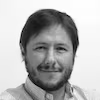
La aparición de la bicicleta con pedales revolucionó el mundo. Fue a mediados del siglo XIX y transformó la manera de desplazarse de las personas —especialmente la de las clases más populares—. También modificó las dinámicas de las relaciones humanas. El nuevo vehículo permitía llegar más lejos. Al pueblo de al lado, por ejemplo. Otorgaba una novedosa sensación de independencia y libertad a quienes la utilizaban. No tardó demasiado tiempo en convertirse en deporte. Con la creación del Tour de Francia en 1903, el ciclismo iniciaba su particular ascenso hacia la globalidad de la que hoy disfruta. Y la bicicleta comenzó a colarse en algunos de los momentos más importantes de los últimos 100 años.
Un siglo cuesta arriba (Altamarea) es el libro en el que el doctor en Historia Ramon Usall recorre la historia popular y política más reciente del ciclismo. Lo hace en 40 didácticos capítulos que abarcan desde el caso Dreyfus —que estuvo de forma indirecta en los orígenes de la gran ronda gala— hasta el fallido homenaje a la firma del Tratado de Maastricht. La famosa bicicleta del jefe de la inteligencia del IRA Michael Collins; Gino Bartali y Palmiro Togliatti ayudando a bajar los decibelios en la Italia de 1948 y ahuyentando una posible revolución; la competición entre ciclistas estadounidenses y soviéticos en plena Guerra Fría y un Tour de Francia empezando a los pies del muro de Berlín en 1987, solo dos años antes de su caída; las calles de Francia llenas de velocípedos en el mayo de 1968; Perico Delgado entrando con el maillot amarillo en los Campos Elíseos en 1988, con las relaciones hispano-francesas bajo mínimos; gobiernos de todo signo político han utilizado diferentes rondas ciclistas para trazar sus fronteras —ahí estaba el Tour entrando en Alsacia y Lorena, para enfado de Alemania— y lanzar los mensajes que más les convenían. Un libro divertido, lleno de información y detalles, que sitúa al ciclismo en su merecido lugar en la Historia.
Puedes seguir a EL PAÍS Deportes en Facebook y X , o apuntarte aquí para recibir nuestra newsletter semanal .
Suscríbete para seguir leyendo
Sobre la firma, más información.
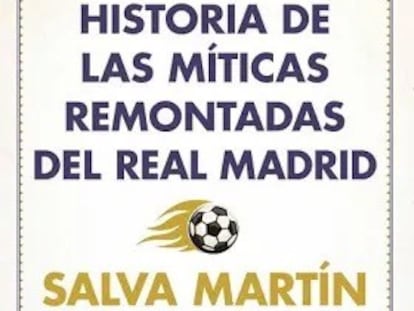
Temporada de remontadas
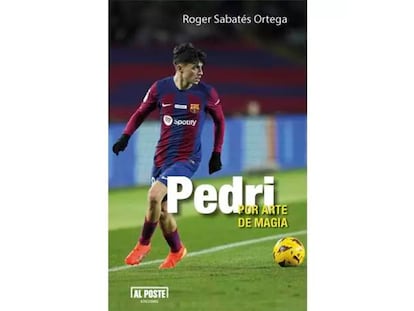
La velocidad de Pedri
Archivado en.
- Libros deportivos
- Competiciones
- Perico Delgado
Lo más visto
- La pifia de Laporta
- El coraje de dos mujeres contra las brechas de género y de raza
- Estados Unidos indemniza a las gimnastas víctimas de abusos de Larry Nassar por la negligencia del FBI
- Así domina Jude Bellingham el territorio más allá del minuto 80
- En escena, el espectáculo del metabolismo humano: así nos ayuda correr en el día a día
- Cursos online
- Idiomas online
- Crucigramas & Juegos
- Colecciones

- Francés online
- Inglés online
- Italiano online
- Alemán online


COMMENTS
Pedro Delgado Robledo (pronounced [ˈpeðɾo ðelˈɣaðo roˈβleðo]; born 15 April 1960), also known as Perico (), is a Spanish former professional road bicycle racer.He won the 1988 Tour de France, as well as the Vuelta a España in 1985 and 1989.He finished in the top 10 of eighteen Grand Tours.. Delgado tested positive for the known masking agent Probenecid during the 1988 tour.
Over the course of a 12-year career, Pedro Delgado became one of the most successful Spanish Grand Tour riders of the 1980s and 1990s. Among his successes were four stages and an overall win at the Tour de France, and five stages and two overall titles at the Vuelta a Espana.
Join us and celebrate cycling culture with Rouleur. Fifteen years on from Luis Ocaña in 1973, no Spanish rider had won the Tour de France. Delgado starts the race downbeat, but soon has the nation glued to their radios. 'Perico' recalls a long day to Alpe d'Huez. On the 1988 Giro, Delgado was far from outstanding, finishing seventh, 17 ...
Pedro Delgado. If I live to be 100 years old—or, at the bare minimum, remain a Tour photographer until my sixties—I do not believe I will encounter a Tour de France winner as serene as Pedro Delgado. The Spanish climber was a runaway winner of the 1988 Tour, taking the race lead with over ten days to go and defending his position with ease.
It's hard to imagine that it's been 18 years since Pedro Delgado took a hard-fought victory at the 1988 Tour de France. These days, Delgado — "Perico" as he's known in Spain — spends much of his time serving as a regular commentator for Spanish national television's coverage of cycling. Working with colleague Carlos De Andres, Delgado offers viewers insightful and articulate ...
Pedro Delgado at the 1989 Tour de France (Image credit: Bettini Photo) It will be hard for some bike fans to believe given that Pedro Delgado still looks almost as fit and sprightly now as he did ...
Pedro Delgado career profile. Talented climber Pedro Delgado was Spain?s third ever winner of the Tour de France [in 1988] as well as a double winner of the Tour of Spain. Famous for his explosive ...
The 1988 Tour de France was the 75th edition of the Tour de France, taking place from 4 to 24 July. It consisted of 22 stages over 3,286 km (2,042 mi). The race was won by Pedro Delgado with the top three positions at the end of the race being occupied by specialist climbers. This Tour was nearly 1,000 km shorter than the previous few editions ...
Pedro Delgado Robledo , also known as Perico , is a Spanish former professional road bicycle racer. He won the 1988 Tour de France, as well as the Vuelta a España in 1985 and 1989.
Pedro Delgado (born 1960-04-15 in Segovia) is a former professional road racing cyclist from Spain, active between 1979 and 1994. His best results are winning GC Tour de France and 2 wins in GC La Vuelta ciclista a España.
Pedro Delgado - Estamos enseñando a ganar, cuando deberíamos enseñar a convivir con la derrota. ¡¡Hola!! Quiero darte la bienvenida a mi página web. En ella podrás encontrar toda la información sobre mi biografía como ciclista, así como sea un punto de partida y de orientación a tantos y tantos aficionados que hay a este deporte ...
The prologue in 1989 was a disaster for Spanish rider, Pedro Delgado. Delgado finished the first day of the race, a 7.8 km time trial in Luxembourg, 2'54" down on the winner, Dutchman Erik ...
What it is: The 1995 autobiography of Pedro Delgado, one-time winner of the Tour de France, two-time victor at the Vuelta a España Strengths: It offers a sometimes engaging glimpse into life in ...
Pedro takes the «maillot jaune» in the 1988 Tour. Indurain working for his team-mate and leader in this Tour. Once again a black cloud loomed on the horizon in the Tour. After winning the Villard de Lans uphill time trial the next day where he had practically won the race, a terrible mistake made by the Tour's anti-doping control medical ...
Success at the Tour de France never came easily for Pedro Delgado. A stomach bug here…a broken collarbone there…a missed start…you name it. There was something that always seemed to get in the way of Delgado when it came to his Tour aspirations. But when he did put it all together, in 1988, his victory put to rest years of frustrations ...
Pedro Delgado, the defending champion, missed his start time with 2:40 at the prologue at the start of the 1989 Tour de France.Delgado covered the distance only 14 seconds slower than Erik Breukink, the stage winner.But adding the 2 minutes and 40 seconds at his time, he became the only defending champion to begin the race in last place, 2:54 behind Breukink.
PDM's best finisher in the 1988 Tour was Steven Rooks, who came second overall behind Pedro Delgado, won on l'Alpe d'Huez and claimed the king of the mountains title. Rooks confessed to ...
Pedro Delgado Tour de Francia. Mi análisis del recorrido del Tour de Francia 2023, presentado el 27 de octubre 2022. ... por Pedro Delgado | Nov 4, 2021 | Tour de Francia. Aprovechando mi presencia en L'Etape de Granada 2021 by Le Tour de Francia, Iñigo Zubeldía (@Inigo_Zubeldia) me hizo la siguiente entrevista donde... Tour de Francia 1993 ...
Overview. Go beneath the streets on this tour of the spectacular, mind-bending Moscow Metro! Be awed by architecture and spot the Propaganda, then hear soviet stories from a local in the know.Finish it all up above ground, looking up to Stalins skyscrapers, and get the inside scoop on whats gone on behind those walls.
Moscow Metro. The Moscow Metro Tour is included in most guided tours' itineraries. Opened in 1935, under Stalin's regime, the metro was not only meant to solve transport problems, but also was hailed as "a people's palace". Every station you will see during your Moscow metro tour looks like a palace room. There are bright paintings ...
You may not agree with him, but you can't accuse 1988 Tour de France winner Pedro Delgado of being shy about stating his opinions regarding the sport in which he made his living. Now a cycling commentator for Spanish national television, Delgado still works in and around cycling and he often doesn't like what he sees. In this the second of a two-part interview with VeloNews contributor ...
This metro tour of Russia's capital and most populous city, Moscow, is your chance to get a unique insight into the beautiful and impressive architecture of the city's underground stations. Admire their marble walls and high ceilings representing Stalin's desire for glory after World War 2, and see first-hand how the interiors change with the ...
Moscow Metro private tours. 2-hour tour $87: 10 Must-See Moscow Metro stations with hotel pick-up and drop-off. 3-hour tour $137: 20 Must-See Moscow Metro stations with Russian lunch in beautifully-decorated Metro Diner + hotel pick-up and drop off. Metro pass is included in the price of both tours.
El ciclismo también es política 'Un siglo cuesta arriba' (Altamarea), del doctor en Historia Ramon Usall, recorre la historia popular y política más reciente de este deporte en 40 ...